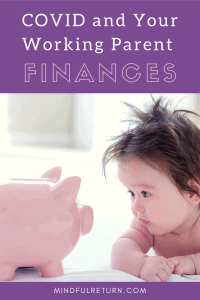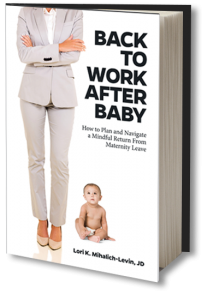
For working parents, finances are always a hot topic. So many things have changed in this alternate-reality universe of 2020. For many of us, money is one of these things that have shifted. Perhaps you’ve been affected by layoffs, pay cuts, or reduced hours. Or maybe what you’re spending money on these days has changed. Regardless, it’s always helpful to talk to experts to be intentional about our saving and spending.
Today, I’ve invited Liz Simasek as a guest on the Mindful Return blog. Liz is a Private Wealth Advisor based in New York at UBS Private Wealth Management. She weighs in on COVID’s impact on the finances of working parents below. (Also join me for a LIVE interview with Liz on November 17 at 3:30pm ET by signing up here!)
Hope you find our interview helpful!
***********************************************************************************
Mindful Return: Does COVID change anything about how I should be thinking about my personal finances?
Liz: That’s a great question. The answer is that it may not necessarily change anything. But you won’t know unless you review your family’s finances now. Some parents haven’t seen a change in their jobs or their salaries, while others have. No matter where you fall, I’m going to suggest two things to consider.
First, it’s always a good time to review your personal finances. Consider your savings, spending, and budget. When I say budget, think about some big ticket items you know are coming. This might be a tuition payment, house repair, or new car. If you haven’t thought about these in a while, then now is the perfect time to do so, regardless of whether your income is the same or different.
As boring as it sounds, you should start taking a regular look at your expenses and overall budget. You can create your own excel spreadsheet, and there are apps that can help you track your spending. Also, many credit cards will break down expenditures on their online accounts. These will all help you to figure out a run rate and be able to get a good sense of what you’re spending per month pretty quickly.
Second, why re-visit your spending and savings if your income hasn’t changed? Because the way in which you’re spending money may have changed. In general, people are spending more on stay-at-home items and less on travel, clothing, and entertainment. You may think you’re saving money by not going to the movies and dinner every Friday night (while paying a sitter), but you may be compensating by spending on takeout, nice wine, and a new flat screen TV. You might even be spending more!
To try to answer the original question succinctly, now is a perfect time to look under the hood at your personal finances regardless of how much has changed in your home life. You may be surprised at some new spending or savings patterns you uncover.
Mindful Return: How would you encourage parents to calm their anxieties about money in such a seemingly unstable world?
Liz: The first thing I would say – besides taking a deep breath – is to review where you are right now. Perhaps start with what’s coming in each month, and what’s going out.
Second, being open with your spouse or partner – or even with yourself – is so important. Have the “money talk” with your partner and think about how you both view money. Are you a saver and is your partner a spender? Are you risk averse and is your partner an all-in risk taker?
Third, have the “goals talk.” What’s important to you? What do you want? Whom do you want to take care of? COVID may have changed some goals or the time in which you wanted to reach them. I know one family that was planning the big Disney World knock-your-socks-off family trip, but now, because of COVID, it’s postponed for about two years. This is shifting how the family is saving because their timing moved.
A great place to start down the communication path is to take the Money Move Quiz, which takes less than a minute. You can find it here: https://www.ubs.com/us/en/wealth-management/my-money-moves/quiz.html
Finally, don’t worry about what everyone else is doing. That causes such unnecessary stress, and no two families are alike.
Mindful Return: What would you say to a parent who has recently experienced – or anticipates she may experience – a layoff? Any financial steps to take either just before or just after it happens?
Liz: Having a liquidity strategy is really important – that goes for everyone. Specifically, I’m talking about short-term needs. Usually our salaries cover a lot of our monthly recurring expenses, like rent, food, car payments, etc. But if a salary is reduced or eliminated, then we need another liquid source to meet those needs.
To re-visit budgeting, it’s key to know exactly what your monthly expenses are. Then, consider holding at least six (or even twelve) months of cash in a liquid manner to meet expenses. Make sure you can meet your “basics” with a liquidity strategy.
Mindful Return: Lots of parents are barely holding on to their careers given the lack of available childcare during COVID, and many are dropping out of the workforce altogether. Are there long-term financial issues you think someone should consider before deciding to completely throw in the towel?
Liz: Absolutely. First, consider working with your financial advisor on a financial plan. A good plan can outline where you are right now and project outcomes into the future under different scenarios. It’s a great tool we use with clients on an ongoing basis.
Second, think about not only your savings, but also any debts and how they’re being addressed now. If you have significant student loans, consider the strategy for paying them down. In terms of savings, you may have 529 plans and 401Ks. Ignoring certain tax-advantaged strategies like these may prove frustrating in the future.
One caveat: if you are thinking about any major changes, or want to explore ideas, then be sure you talk to your attorney or accountant as well. I don’t provide tax or legal advice in my capacity as a UBS employee, so be sure to seek advice from the appropriate professional(s). However, starting with your financial picture and updating, or creating, a plan is a great way to take control now.
I’d like to close by saying that you shouldn’t be embarrassed to ask for help. There’s never a silly question or situation. I think sometimes parents are afraid they’ll look uneducated or immature, but don’t be shy. Think about it this way: I go to doctors when I need medical help, because they’re the experts. Examining and helping me medically is what a doctor is trained to do. That same rule should apply for your finances!

Liz Simasek has been in the financial services industry since 2005. Her experience includes advising high net worth families, individuals, corporate pension plans, and foundations. She has extensive experience leading discussions on critical decisions such as investment goals, legacy planning, and appropriate asset allocation and cash flow strategies. Liz graduated cum laude from Princeton University with a Bachelors’ degree in Politics, and also played on the Women’s Varsity Golf team. She worked for both the PGA Tour and the PGA of America before earning an MBA from the Kenan-Flagler Business School at the University of North Carolina – Chapel Hill.
Want more practical tips on working parenthood? Check out my book, Back to Work After Baby: How to Plan and Navigate a Mindful Return from Maternity Leave



